|
Socialize
Puppies
Socializing
puppy's while they are still with a breeder is very important. We
spend a lot of time and attention to our puppy's while there in
our house. The result after 8 weeks of high care is very positive
as well for the puppy's as for the new owners. All this makes it
for us worth while to keep on doing it like we do.
Why do we socialize the
puppies.
I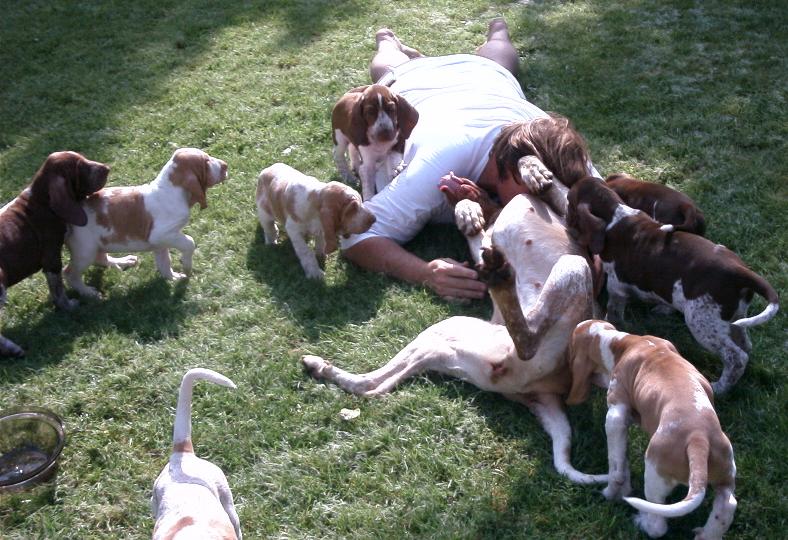 n
nature the leader of a peck of wild dogs or wolves take over the
upbringing from the mother when the puppy's are four weeks old.
As a breeder we have to take over this role and let the puppy's
get used to strange things in the house, they have to meet other
people, children, other animals and all kind of new sounds and smells. n
nature the leader of a peck of wild dogs or wolves take over the
upbringing from the mother when the puppy's are four weeks old.
As a breeder we have to take over this role and let the puppy's
get used to strange things in the house, they have to meet other
people, children, other animals and all kind of new sounds and smells.
Dogs pass through several
phases in there lives and from impressing phase witch's starts when
they are four weeks old until the grow to maturity it is important
to pay lots of attention to upbringing the puppy's and let them
get used by there surroundings. From the impressing phase until
the grow to maturity is the moment when dogs learn easy and fast.
So we have to make use of this phases. We try to do our best to
socialize our puppy's as good as possible. Our puppy's grow up in
our house. .jpg) When
the puppy's have had there first vaccination (at 6 weeks) we take
them by car to places where they can meet other people and see and
hear other, not familiar things. We start as early as possible with
house training (this is between the 4th or 5th week) and we also
start to learn the puppy's that sleeping in a bench (small kennel
in the house) is a normal thing, so when they go to there new owner
they are used to this and feel secure and save. During the 8 weeks
in our house, the puppy's are our responsibility and we put a lot
of time and afford in them. When
the puppy's have had there first vaccination (at 6 weeks) we take
them by car to places where they can meet other people and see and
hear other, not familiar things. We start as early as possible with
house training (this is between the 4th or 5th week) and we also
start to learn the puppy's that sleeping in a bench (small kennel
in the house) is a normal thing, so when they go to there new owner
they are used to this and feel secure and save. During the 8 weeks
in our house, the puppy's are our responsibility and we put a lot
of time and afford in them.
Every age a different
phase:
Vegetative phase
/ Neonatal phase (0 until 3 weeks)
The puppy is blind and deaf and only drink, sleep and squeak. The
sense of smell is already there.
Transitional phase
(3 until 4 weeks)
In the third week after being born the eyes and ears open up. The
puppy's are going to walk and discover the litter hole, the puppy's
are going to stimulate the mother dog to throw up her food for them
by robbing her mouth. In nature the puppy's shall try to leave the
litter hole when they are around 18 days.
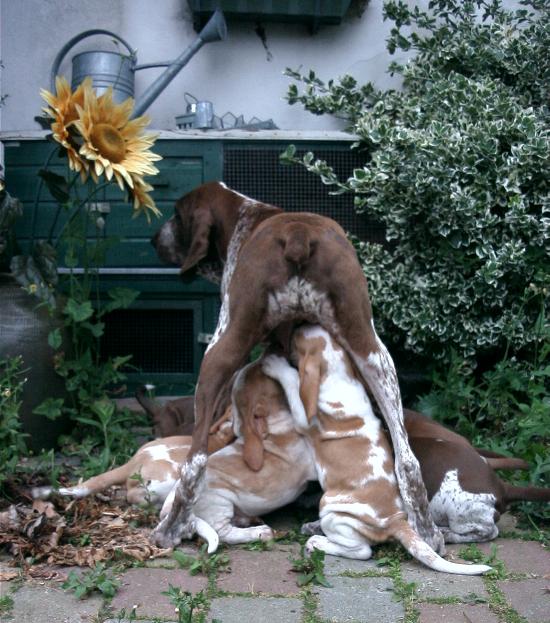 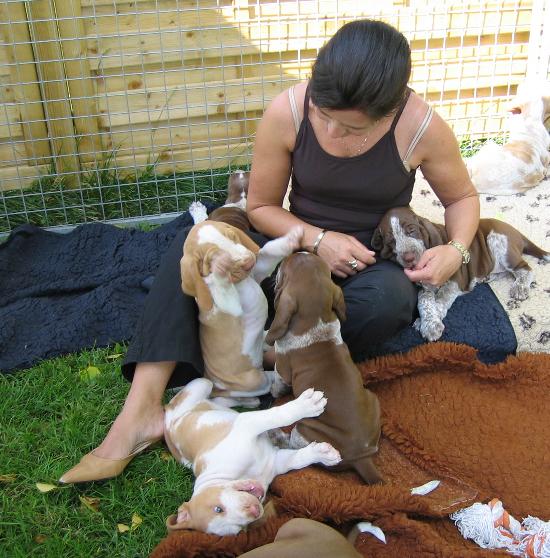 The
other dogs in the peck will throw themselves on these puppy's and
the puppy's will scream and lay down on there back and try to go
back to the litter hole as soon as they can. De puppy's now have
learn; Absolute obedience to all dogs who are higher in peck rang;
Subject to every dog in the herd who is higher in peck rang; The
litter hole is a safe place for them. The
other dogs in the peck will throw themselves on these puppy's and
the puppy's will scream and lay down on there back and try to go
back to the litter hole as soon as they can. De puppy's now have
learn; Absolute obedience to all dogs who are higher in peck rang;
Subject to every dog in the herd who is higher in peck rang; The
litter hole is a safe place for them.
Impressing phase
(4 until 7 weeks) The puppy is now fully developed. In this short
period the puppy's must, as much as possible, have positive contact
with humans and animals. Exactly at the age of 7 weeks our puppy's
have to take the puppy test, here we can see if the puppy is social
and if they have nature hunting ability. Does the pup grows up in
a isolated area, like in a puppy shed, then the puppy grows up as
a socially inhibited dog, who will always be afraid of human and
other animals and bite extremely fast out of fear.
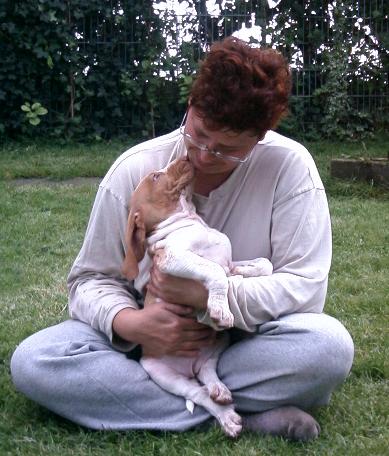 Socialisation
phase and first phase of emotional instability (8 until 12 weeks). Socialisation
phase and first phase of emotional instability (8 until 12 weeks).
The puppy's can now go to there new homes. Let the puppy gradual
used to cars, busses, trains, shopping malls etc. Until now the
puppy was aloud to do what ever he wanted to do, but this has to
change in this period. In nature the education of the puppy's are
on the shoulders of the older dogs followed by peck rang, to begin
with the father or when is he not around the mother on extremely
authoritarian way. When the puppy takes his place in a human world,
it is necessary that he learns in this period to accept a human
as his educator and authorial. When the owner play games with the
puppy, the puppy is never aloud to win. In this period you have
to take care that the puppy comes in contact with all kind of dogs.
Otherwise he will become a human dog who has trouble to understand
dog behaviour. When the puppy get older this could give problems
in nature of aggressive or panic behaviour when you walk him in
a park or other places where strange dogs comes.
We can housetrain the puppy easy by
take him outside after eating, sleeping and playing. Take him to
the place were he is aloud to do his needs, and he will understand
very fast not to do it in your house anymore (it is normal to have
little accidents now and then). 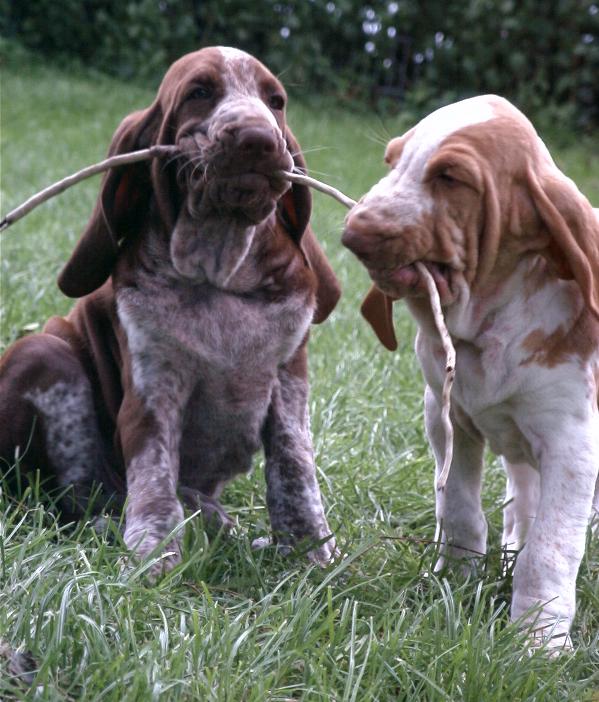 You
have to learn the puppy to respect your furniture, other small pets
like rabbit etc. Of course you have to let him have his own toy's,
dog toy's of ofcourse. Between 8 and
10 weeks the puppy goes to through his first period of emotional
instability, this is a period with's can leave fear impressions
easily. Try to avoid strange, fearful and unexpected situations. You
have to learn the puppy to respect your furniture, other small pets
like rabbit etc. Of course you have to let him have his own toy's,
dog toy's of ofcourse. Between 8 and
10 weeks the puppy goes to through his first period of emotional
instability, this is a period with's can leave fear impressions
easily. Try to avoid strange, fearful and unexpected situations.
Juvenile phase (13
weeks until 9 month) with:
The first herd phase (13
until 16 weeks).
Second herd phase (16 weeks until 9 month) with again a period
of emotional instability (16 until 20 weeks).
In nature this period is characteristic for the pups to take in
there place in the herd. Puppy's will try to get there particular
place in the herd in beginning just by showing physical power among
the other puppy's, but this primitive way soon makes place for recognition
of there personality and self-assuredness. 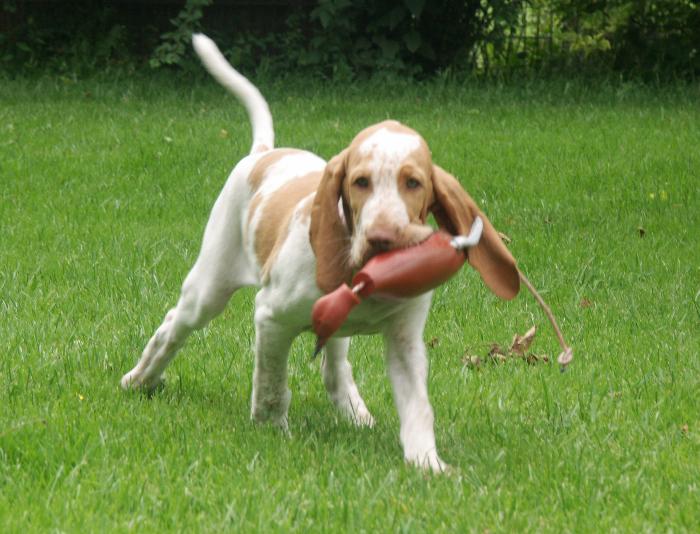 Especially
in relation of there father this will come out the best. This would
be for us the best moment to make a start with simple exercises
like: sit on command or retrieve a bal. Retrieve games during the
period that the puppy is changing his teeth is not recommended because
they could associate pain in the mouth with the retrieve material. Especially
in relation of there father this will come out the best. This would
be for us the best moment to make a start with simple exercises
like: sit on command or retrieve a bal. Retrieve games during the
period that the puppy is changing his teeth is not recommended because
they could associate pain in the mouth with the retrieve material.
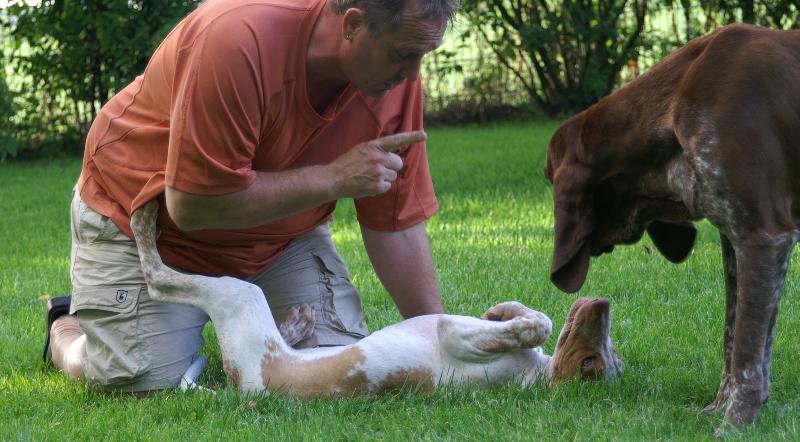 By
doing this practise the right peck order will be developed and the
puppy will be more docile. You don't do these training more then
ones a day, but repeat this the next days. After a couple of days
the puppy understands what you mean. Other commando's you learn
him the same way, we only teach the dog by rewarding him, never
by punishing him. By
doing this practise the right peck order will be developed and the
puppy will be more docile. You don't do these training more then
ones a day, but repeat this the next days. After a couple of days
the puppy understands what you mean. Other commando's you learn
him the same way, we only teach the dog by rewarding him, never
by punishing him.
The second herd phase.
In this period it is good
to extensive the obedience training and take this more serious then
before. This not means that you have to start shouting or punishing
him! No, you are going to exercise the puppy on a friendly way and
only with rewarding. This way you achieve more. Now is a good moment
to enter a puppy trainings class. Here you meet other people and
other dogs and when you choose the right association you get feedback
from the trainer.
Second period of emotional
instability. Between 16
and 20 weeks the puppy goes through the second period of emotional
instability, even when the puppy is socialize good and not fear
human he can react very heavy to strange people and different surroundings.
Try to avoid strange, fearful and unexpected situations. In this
period it is more wrong to punish the puppy physically (NB: is always
wrong), because they don't seem to know how to handle this pressure.
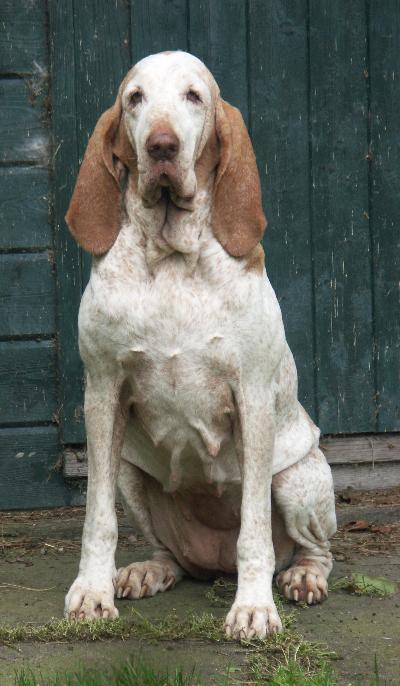 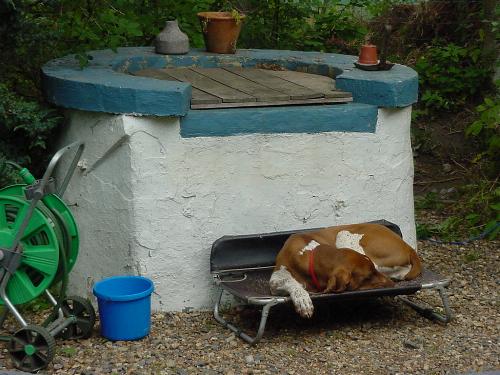 Grow
to maturity (9 month until 2 year - depending with's breed) Grow
to maturity (9 month until 2 year - depending with's breed)
This phase does not bring much news, although we call this phase
also the "puberty phase". The experience witch's are in the puppy's
memory can now explored and we can build further on the good behaviour
and obedience. You have to have patience with your dog, your dog
have lots of patience with you! From our experience with Bracchi
we can say that this breed is mental and physical mature between
the age of 20 until 27 month. Do you have a male then you see he
will physical grow until he is 27 month minimum.
Old age
phase (7 / 13 year - depending with's breed)
A dog age can be compare with a human age but we have to make a
multiplication with the number 7. (example: your dog is 10 years
old- compare it with human age and we say 10 X 7 = the dog is 70
years old) You have to adapt your activities to his age. You also
have to look at his food consumption. Normally a old dog is less
active and when you don't change the food consumption it is possible
that he will grow to fat.
|

 n
nature the leader of a peck of wild dogs or wolves take over the
upbringing from the mother when the puppy's are four weeks old.
As a breeder we have to take over this role and let the puppy's
get used to strange things in the house, they have to meet other
people, children, other animals and all kind of new sounds and smells.
n
nature the leader of a peck of wild dogs or wolves take over the
upbringing from the mother when the puppy's are four weeks old.
As a breeder we have to take over this role and let the puppy's
get used to strange things in the house, they have to meet other
people, children, other animals and all kind of new sounds and smells.
.jpg) When
the puppy's have had there first vaccination (at 6 weeks) we take
them by car to places where they can meet other people and see and
hear other, not familiar things. We start as early as possible with
house training (this is between the 4th or 5th week) and we also
start to learn the puppy's that sleeping in a bench (small kennel
in the house) is a normal thing, so when they go to there new owner
they are used to this and feel secure and save. During the 8 weeks
in our house, the puppy's are our responsibility and we put a lot
of time and afford in them.
When
the puppy's have had there first vaccination (at 6 weeks) we take
them by car to places where they can meet other people and see and
hear other, not familiar things. We start as early as possible with
house training (this is between the 4th or 5th week) and we also
start to learn the puppy's that sleeping in a bench (small kennel
in the house) is a normal thing, so when they go to there new owner
they are used to this and feel secure and save. During the 8 weeks
in our house, the puppy's are our responsibility and we put a lot
of time and afford in them.
 The
other dogs in the peck will throw themselves on these puppy's and
the puppy's will scream and lay down on there back and try to go
back to the litter hole as soon as they can. De puppy's now have
learn; Absolute obedience to all dogs who are higher in peck rang;
Subject to every dog in the herd who is higher in peck rang; The
litter hole is a safe place for them.
The
other dogs in the peck will throw themselves on these puppy's and
the puppy's will scream and lay down on there back and try to go
back to the litter hole as soon as they can. De puppy's now have
learn; Absolute obedience to all dogs who are higher in peck rang;
Subject to every dog in the herd who is higher in peck rang; The
litter hole is a safe place for them. Socialisation
phase and first phase of emotional instability (8 until 12 weeks).
Socialisation
phase and first phase of emotional instability (8 until 12 weeks). You
have to learn the puppy to respect your furniture, other small pets
like rabbit etc. Of course you have to let him have his own toy's,
dog toy's of ofcourse. Between 8 and
10 weeks the puppy goes to through his first period of emotional
instability, this is a period with's can leave fear impressions
easily. Try to avoid strange, fearful and unexpected situations.
You
have to learn the puppy to respect your furniture, other small pets
like rabbit etc. Of course you have to let him have his own toy's,
dog toy's of ofcourse. Between 8 and
10 weeks the puppy goes to through his first period of emotional
instability, this is a period with's can leave fear impressions
easily. Try to avoid strange, fearful and unexpected situations.
 Especially
in relation of there father this will come out the best. This would
be for us the best moment to make a start with simple exercises
like: sit on command or retrieve a bal. Retrieve games during the
period that the puppy is changing his teeth is not recommended because
they could associate pain in the mouth with the retrieve material.
Especially
in relation of there father this will come out the best. This would
be for us the best moment to make a start with simple exercises
like: sit on command or retrieve a bal. Retrieve games during the
period that the puppy is changing his teeth is not recommended because
they could associate pain in the mouth with the retrieve material.
 By
doing this practise the right peck order will be developed and the
puppy will be more docile. You don't do these training more then
ones a day, but repeat this the next days. After a couple of days
the puppy understands what you mean. Other commando's you learn
him the same way, we only teach the dog by rewarding him, never
by punishing him.
By
doing this practise the right peck order will be developed and the
puppy will be more docile. You don't do these training more then
ones a day, but repeat this the next days. After a couple of days
the puppy understands what you mean. Other commando's you learn
him the same way, we only teach the dog by rewarding him, never
by punishing him.  Grow
to maturity (9 month until 2 year - depending with's breed)
Grow
to maturity (9 month until 2 year - depending with's breed)